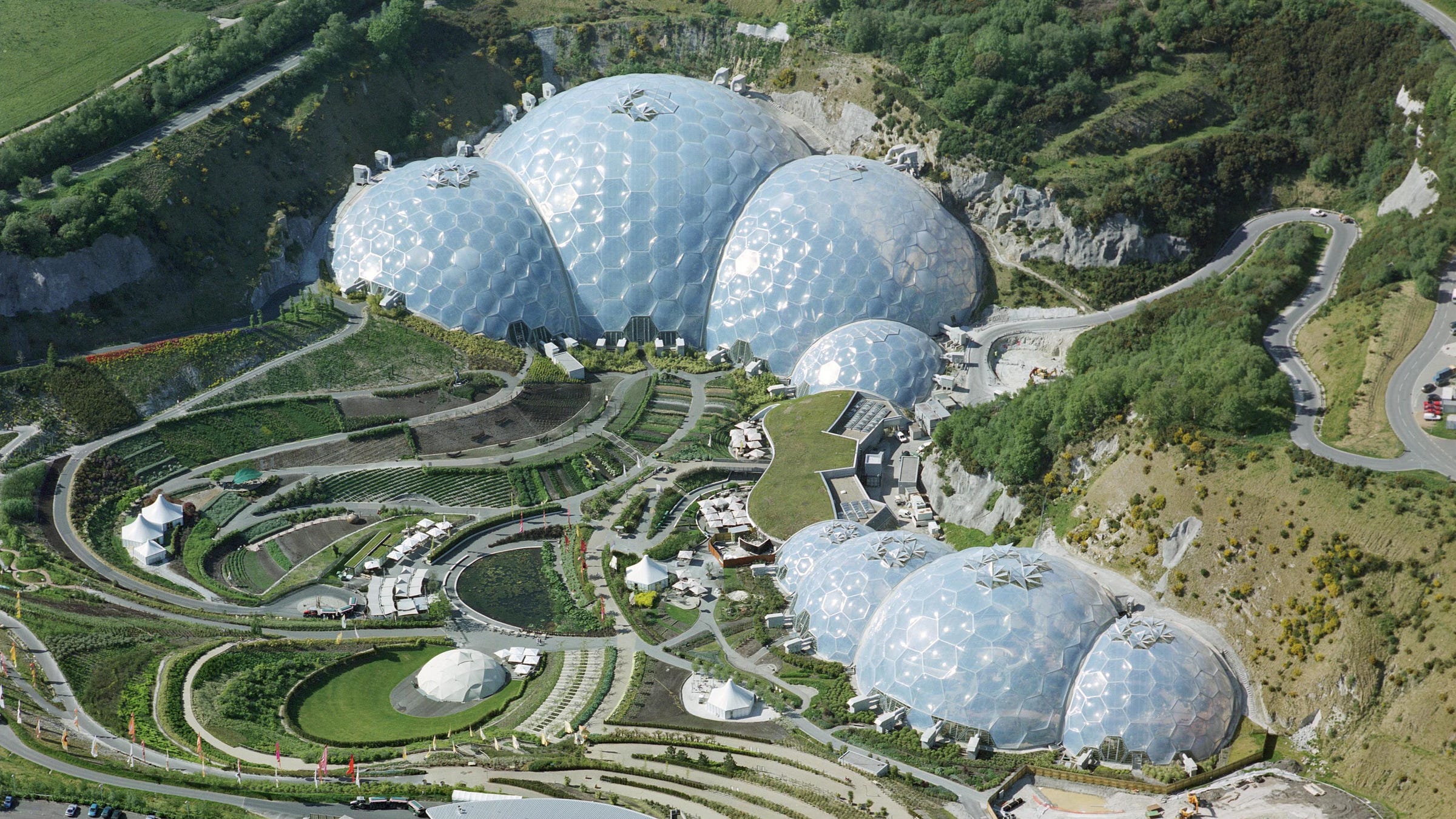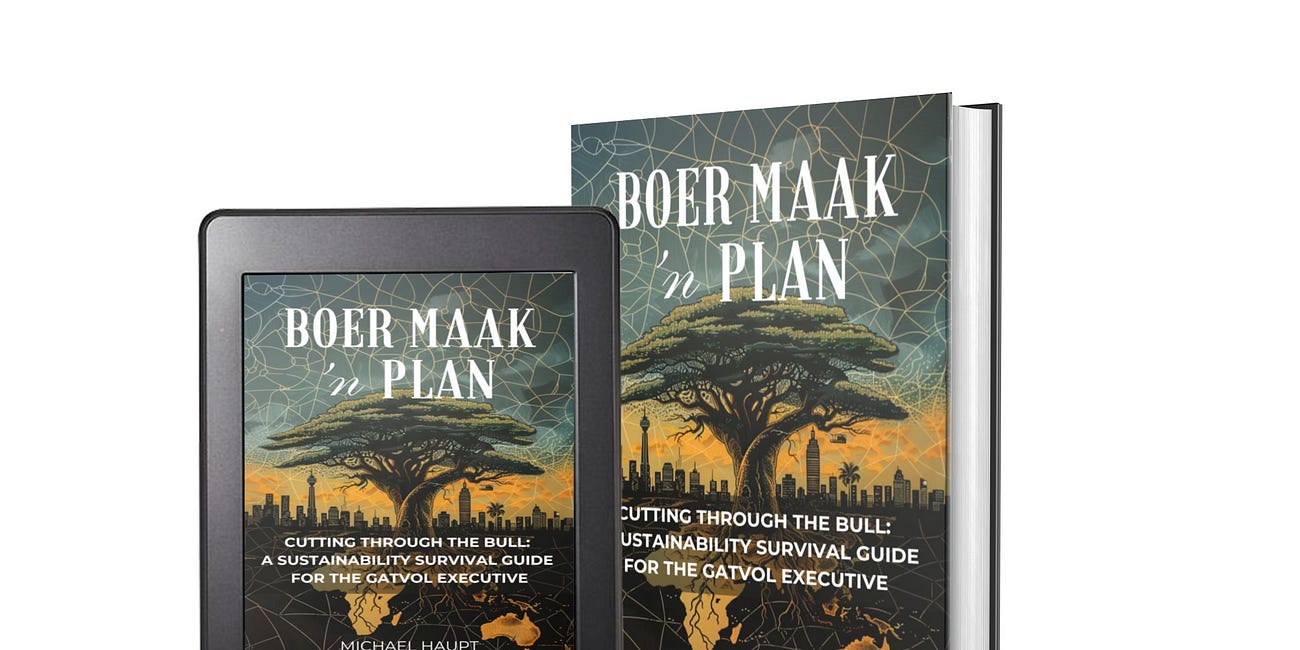Boer Maak 'n Plan - Chapter 17 - Tomorrow's Truths
Seeding the Future with Audacious Aspirations

In mid-2000, I encountered the concept of a “future truth” while listening to a radio interview in London with Sir Tim Smit, the mastermind behind the Eden Project in Cornwall. His words resonated deeply as he spoke about the power of conviction, determination, and commitment to manifest a reality that may seem improbable in the present. He described standing in an abandoned quarry, declaring, “One day, this will be a major tourist attraction visited by millions from all over the world.” Today, that once-derelict site has been transformed into a magnificent dome structure, attracting millions of visitors and contributing over £1.9 billion to the Cornish economy.
A “future truth,” as Smit explained, is something that isn't true now but will be true one day. This serendipitous introduction to the concept has shaped my mindset for decades, ultimately finding its most profound expression in this book. In this chapter, we will explore a world where South African corporations have embraced their role as catalysts for an ecological civilisation, empowering rural communities as stewards of their bioregions.
The True Purpose of Business
In 2023, I had the pleasure of dialoguing with Tim Smit personally over a Zoom call. Our conversation delved into the urgent need for a seismic shift in corporate responsibility, prioritising the well-being of the planet and all living things. His message prompted me to revisit Milton Friedman's notorious 1970 claim that “the social responsibility of business is to increase its profits.” In light of existential crises, this narrow conception of corporate purpose is not only inadequate but actively destructive.
I propose that the true social responsibility of business is to increase all forms of capital—Natural, Social, Cultural, Spiritual, and Financial—within the bioregional footprint in which a company operates. By aligning business activities with the regeneration and enrichment of these interdependent systems, businesses can become catalysts for a truly flourishing and resilient future. This shift demands a radical re-imagining of what it means to be a successful enterprise, moving beyond short-term profits to embrace a more expansive vision of value creation.
To explore how we accomplish this shift, let’s tell a future truth.
The Riviersonderend Valley: A Future Truth of Regenerative Resilience
Fast forward to 2045. The once-barren hillsides of the Riviersonderend Valley now burst with life, as visitors and locals gather for the Annual Southern African River Basin Regeneration Awards (SARBRA). The landscape has been reborn, pulsing with the vitality of abundant food and biodiversity. Lush food forests teem with indigenous crops and wildlife, while crystal-clear streams wind through the valley. The air is filled with music, laughter, and gratitude as the community celebrates another year of unimaginable resilience and shared prosperity.
The true guests of honour at this jubilant gathering are the elders, Indigenous land stewards, and community organisers who dared to declare the valley’s resurrection as a future truth. Decades ago, they stood hand-in-hand with an unlikely alliance of corporate executives on the degraded watershed, proclaiming, “One day, this will be a thriving oasis, a model of regenerative abundance for all of Southern Africa and beyond.”
Where others saw a lost cause, these community leaders and their corporate allies saw an opportunity for a revolutionary proof of concept—a chance to show that rural South Africa could lead the way in forging an antifragile future from the grassroots up. With grit, ancestral wisdom, and an unshakable commitment to place, they launched community-driven initiatives to restore the valley’s natural and social resilience.
Year by painstaking year, the tide began to turn. Barren hillsides transformed into verdant oases, and dry riverbeds once again teemed with life. As the ecological integrity of the watershed was restored, so too was the social fabric of the communities who called it home.
The BioCampus: A Nexus of Innovation and Learning
At the heart of this regenerative renaissance lies the BioCampus, the first of many to emerge across South Africa’s revitalised landscapes. Inspired by the visionary concept of Bioregional Learning Centres, the BioCampus is an intersection of innovation, education, and applied knowledge focussed on local food production, soil restoration and revitalising the hydrological cycle.
This vibrant hub attracts students and scholars from around the globe, eager to immerse themselves in the living laboratory of regenerative practice. The dynamic integration of regenerative design principles transforms abstract concepts into tangible, life-affirming solutions. Researchers, innovators, and practitioners converge to exchange insights, experiment with cutting-edge methodologies, and witness the transformative impact of their work on the surrounding bioregion.
The BioCampus is more than just a centre of learning; it is a testament to the power of place-based, bioregionally-attuned education. By deeply integrating with the unique ecological and cultural contexts of the valley, the BioCampus cultivates a profound sense of connection and responsibility among its participants. Students and faculty alike become active stewards of the land, working hand-in-hand with local communities to co-create a resilient and regenerative future.
A Call to Action for Visionary Leaders
The Riviersonderend Valley's transformation sends a resounding message to a world in the throes of breakdown: a genuinely antifragile, state-proofed future is not only possible but irresistibly emerging wherever committed allies come together to declare it into being.
This is the future truth that the Collab of Southern African Resilience (CSAR) has been working tirelessly to manifest in bioregions across South Africa. Through their flagship initiative, the Southern African River Basin Regeneration Awards (SARBRA), they have catalysed a movement of corporate-community collaboration to heal the watersheds that are the lifeblood of the nation.
In each revitalised valley and restored ecosystem, they are planting the seeds of a regenerative economy that can weather any storm—an intricate web of local resilience that meets human needs through its rootedness in place. With every passing year, as more bioregions are reborn through this powerful model of collaboration, Southern Africa moves closer to the future truth of a truly antifragile nation, where every community is empowered to thrive no matter what shocks or disruptions may come.
The Discourse of Privilege and the Imperative for Inclusive Resilience
As we celebrate the incredible transformation of the Riviersonderend Valley and the potential for corporate-community collaboration to forge a regenerative future, it is crucial that we also confront the insidious Discourse of Privilege that pervades our society. This discourse, characterised by a focus on objective measures of well-being and a dismissal of the subjective experiences of the marginalised, has long perpetuated systems of oppression and inequality.
In our pursuit of an antifragile, state-proofed South Africa, we must recognise that true resilience cannot be achieved without addressing the root causes of social and economic injustice. It is not enough to simply “keep the pitchforks at bay” by hiding behind electric fencing and private security companies. We must actively work to create havens of abundance capable of attracting the unemployed away from cities. With this shift in perspective, the countless communities that currently bear the brunt of ecological and economic collapse become our allies in building a resilient region.
This is where the Southern African River Basin Regeneration Awards (SARBRA) strategy comes in. By focusing on building resilience for vital natural resources like water, on which we all depend, SARBRA initiatives create a foundation for inclusive prosperity. They recognise that the well-being of our most vulnerable communities is inextricably linked to the health of our ecosystems and the equitable distribution of the benefits they provide.
Moreover, by empowering rural communities as stewards of their bioregions and supporting the creation of regenerative livelihoods, SARBRA projects offer a pathway to economic empowerment and self-determination for those who have been left behind as the inevitable result of a class-based society. They provide a means for the marginalised to reclaim their agency and shape their own futures, rather than being relegated to the periphery of society.
However, it is not enough for these initiatives to remain isolated pockets of resilience. To truly build an antifragile region, we must work to scale and replicate these models of inclusive regeneration across Southern Africa. We must use our positions of power and influence to amplify the voices and experiences of those who have been silenced, and to channel resources and support to the grassroots leaders and communities who are already doing the work of regeneration on the ground.
As you contemplate your own legacy in the face of inevitable societal breakdown, let this be a call to action to use your privilege in service of the greater good. Let it be an invitation to listen deeply to the stories and struggles of those on the margins, and to use your business as a platform to elevate their visions for a more just and resilient future. Let it be a reminder that our own liberation is bound up with the liberation of all, and that true antifragility can only be achieved through the hard work of building regional resilience and a world that works for everyone.
May you find the courage to declare your own audacious future truths for the bioregions and watersheds that sustain us—and the tenacity to will them into being through strategic partnership and unflagging devotion. Together, through the force of our declarations and the depth of our devotion, we are midwifing the future truths that will become the bedrock of an antifragile Southern Africa—and a shining lodestar for a world in desperate search of a new story.
Questions for Further Reflection
What bold commitments can we make today to align our company’s success with the long-term thriving of the living systems upon which all of our futures depend?
In what ways can we weave the story of our organisation’s sustainability journey into a compelling narrative that inspires others to join the movement and stake their own reputations on the healing of the Earth?
How might the ethos of boer maak 'n plan—the spirit of resourcefulness and resilience in the face of adversity—be applied to the unique challenges and opportunities facing our business and our bioregion?
What legacy do I personally wish to leave? What steps can I take to ensure that my leadership contributes to the great work of birthing an ecological civilisation that honours the sacred interdependence of all life?
Further Reading
To learn more about Future Truths visit https://bit.ly/FutTruth
To learn more about the Eden Project and the role it played in the James Bond movie Die Another Day, visit https://bit.ly/EdProj
To learn more about Biohubs, visit https://bit.ly/Biohubs
To learn more about Bioregional Learning Centres, visit https://bit.ly/BioLearnC
To learn more about the Collab of Southern African Resilience (CSAR), visit https://bit.ly/C54R
Boer Maak 'n Plan—Table of Contents
Want to navigate to a particular chapter quickly? Use these links. Back Cover Blurb Foreword Introduction About the Author Part 1 - The Past: Patterns of Civilisational Cycles Part 1 Introduction Chapter 1 - Barbarians at the Gate: Defending South Africa's Resilience in an Age of Globalisation




